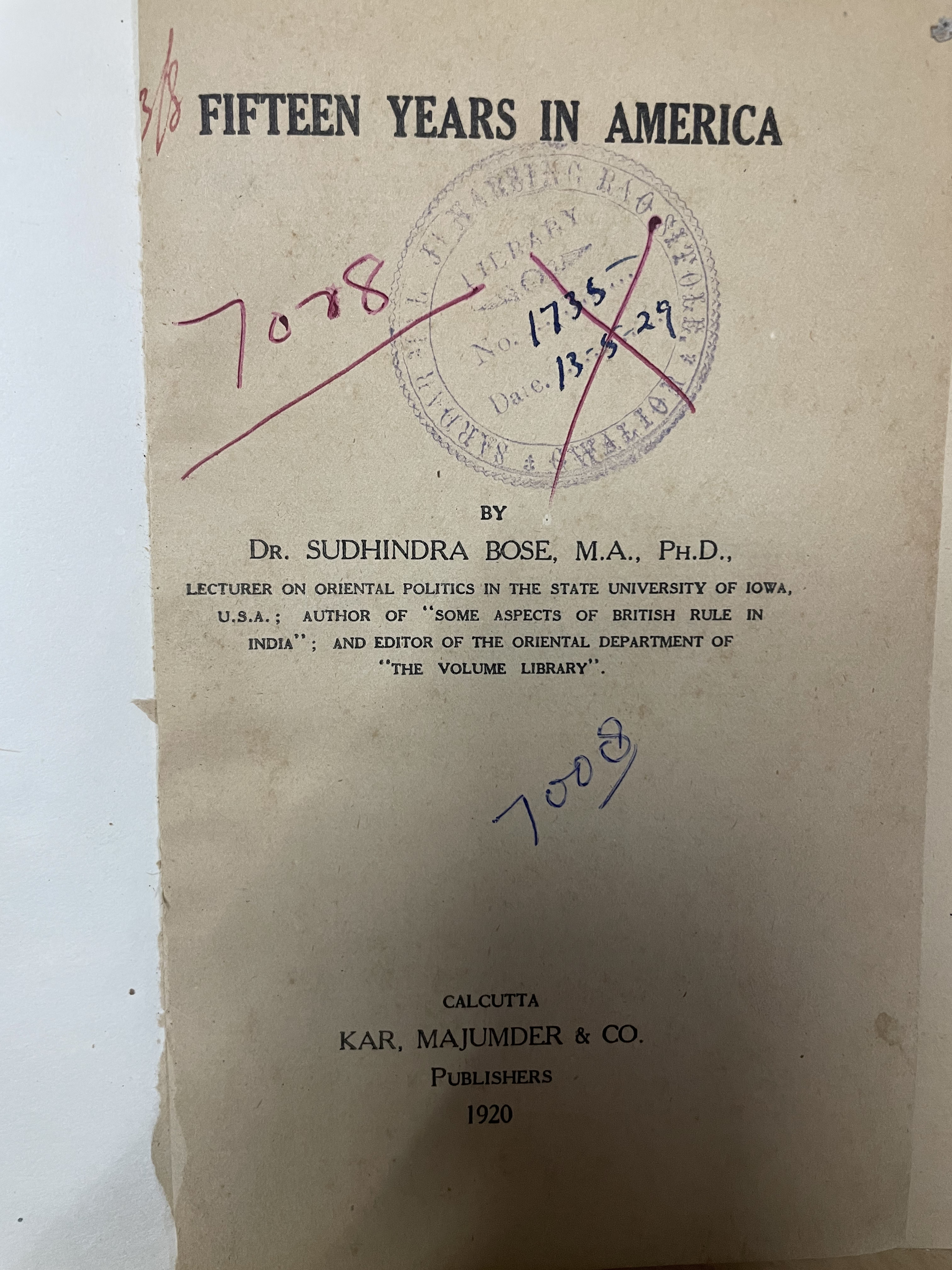Fifteen Years In America

About
Summary
Exquisite
TOC
Details
Related
URL
Images
Overview
Fifteen Years in America by Dr. Sudhindra Bose, published in 1920, offers a unique perspective on the United States during the early 20th century through the eyes of an Indian scholar and political scientist. Bose, born in Bengal Presidency in 1883, arrived in the United States in 1904 and spent fifteen years pursuing his education and career before returning to India. This book, consisting of 479 pages, details his experiences, observations, and reflections on American society, politics, culture, and its people.
Importance of Book
Cross-Cultural Perspective: The book provides a valuable cross-cultural perspective on the United States, offering insights into American society, politics, and culture from the viewpoint of an Indian intellectual.
Historical Documentation: It serves as a historical document, capturing the experiences and observations of an international student in America during the early 20th century.
Promotion of Understanding: Bose's writings and lectures aimed to promote understanding between the East and the West, fostering dialogue and cooperation between different cultures and nations.
Contribution to Political Science: As a political scientist, Bose contributed to the field through his analysis of American politics and his engagement with contemporary political issues.
Representation of Indian Voices: The book represents an early example of an Indian intellectual engaging with American society and offering his perspectives on its strengths and weaknesses.
Key Themes
Cultural Exchange and Understanding: The book emphasizes the importance of cultural exchange and understanding between different nations and cultures.
Democracy and Self-Determination: Bose advocates for democracy and self-determination, challenging notions that Asians were fundamentally different from Westerners in their desire for democratic governance.
Race Relations and Social Justice: The book likely addresses issues of race relations and social justice in the United States, reflecting Bose's commitment to equality and human rights.
Education and Empowerment: Bose highlights the transformative power of education and its role in empowering individuals and communities.
International Cooperation and Peace: The book promotes international cooperation and peace, reflecting Bose's belief in the importance of collaboration among nations to address global challenges.
Cultural Significance
Representation of Indian Identity: The book represents an early example of an Indian intellectual articulating his identity and perspectives in the American context.
Promotion of Indo-American Relations: Bose's work contributed to the promotion of Indo-American relations, fostering dialogue and understanding between the two countries.
Challenge to Stereotypes: The book challenges stereotypes and misconceptions about India and Asia, presenting a more nuanced and informed view of the region.
Celebration of Diversity: It celebrates diversity and multiculturalism, highlighting the richness and complexity of American society.
Contribution to Intellectual Discourse: The book contributed to intellectual discourse on issues of culture, politics, and international relations, enriching the understanding of these topics.
Effects on Society
Promotion of Cross-Cultural Understanding: The book likely promoted cross-cultural understanding by offering Americans insights into Indian culture and perspectives.
Encouragement of Dialogue: It may have encouraged dialogue and engagement between people of different backgrounds, fostering greater understanding and cooperation.
Influence on American Perceptions of India: The book may have influenced American perceptions of India and Asia, challenging stereotypes and promoting more nuanced views.
Inspiration for Future Generations: It may have inspired future generations of Indian intellectuals and students to engage with the world and share their perspectives on global issues.
Contribution to the Discourse on International Relations: The book likely contributed to the broader discourse on international relations and cultural exchange, informing policy debates and promoting greater understanding among nations.
Conclusion
Fifteen Years in America by Dr. Sudhindra Bose is a valuable historical and cultural document that provides insights into the United States during the early 20th century from the perspective of an Indian scholar. The book's importance lies in its cross-cultural perspective, historical documentation, and promotion of understanding between the East and the West. Its key themes include cultural exchange, democracy, social justice, and international cooperation. The book's cultural significance lies in its representation of Indian identity, promotion of Indo-American relations, and challenge to stereotypes. While the precise effect of the book on the country and society is difficult to measure, it likely contributed to promoting cross-cultural understanding, encouraging dialogue, and influencing American perceptions of India.
Title
Fifteen Years In America
Author
Dr Sudhindra Bose
Name of Publisher
Kar Majumdar & Co Calcutta
Publish Date
1920
Subject
Fifteen Years in America is a memoir by Lala Lajpat Rai
Vintage
1901-1947
Number of Pages
479
Category
Literary
Sub Category
Biography
Rarity
RARE
